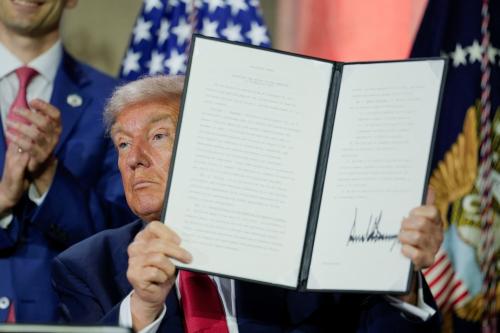In March, FCC Chairman Tom Wheeler traveled to Columbus, Ohio to deliver a major policy address at his alma mater, The Ohio State University. Chairman Wheeler indicated that he was going to “think out loud…about the choices that government agencies must make.”
Much of what he expressed that day has foreshadowed the broadband Internet network policies that he has advocated for during his tenure as FCC Chairman. He is concerned that Internet Service Providers (ISPs) writ large will act as “gatekeepers”. He describes ISPs as “having the power to decide what travels between consumers and the Internet; they have all the tools necessary to block, degrade or favor some content over others. In fact, there is no doubt that broadband providers have the ability to disadvantage companies that need to use their transmission services to distribute products and services to the public.”
Chairman Wheeler’s concern is that broadband Internet gatekeepers will act against consumer interests. This has led him to conclude that there are only two policy options available. “We can have a cop on the beat to enforce common sense rules of the road that ensure Internet openness for consumers and innovators…[or] we can have the people who operate the networks making the rules for the Internet and leave decisions about blocking, throttling, and prioritizing traffic to them.”
The FCC’s regulatory philosophy
This regulatory philosophy now represents the majority view at the FCC. It also resembles an approach that the FCC implemented at the beginning of the 21st century when it considered the historic $165 billion acquisition of Time Warner by American Online.
Back then, AOL was perceived to be an ISP gatekeeper, too, able to wield power to prevent other ISPs from gaining access to Time Warner cable systems. AOL also had an Internet Messaging feature that subscribers could utilize to reach other AOL customers. The FCC similarly reasoned that Time Warner Cable would use its gatekeeping capabilities to prevent AOL competitors from offering IM service to its customers.
Consequently, two specific regulatory provisions were included as FCC conditions for approving the deal. First, all Time Warner cable systems were required to offer one other ISP in addition to AOL. A special master was appointed by the FCC to review the negotiation of ISP contracts with Time Warner Cable and develop remedies if competitors were blocked. The FCC also required that AOL develop a server-to-server IM interoperability approach to the exchange of text-based messages between a user of an AOL IM service and a user of an unaffiliated IM service.
Both of these conditions were premised on the FCC’s static view of technology development and the marketplace itself. Did the FCC really believe that Time Warner cable systems would, as a logical business decision, offer their customers AOL while preventing them from choosing MSN, Yahoo, or dozens of other browser services? For current or potential subscribers, this would have been a non-starter, of course.
Similarly, why would consumers not seek out other IM services, including those offered by multiple ISPs and wireless carriers? Wouldn’t they push back hard if Time Warner Cable prevented any IM service other than AOL?
The problem with fearing gatekeepers
Everything that has transpired in the intervening years has demonstrated that the FCC’s gatekeeper approach was too draconian in that case. The Commission itself recognized the error of its ways by rescinding these restrictions, but only following a number of years and a series of detailed regulatory proceedings.
The lesson for today’s FCC is that there may be other viable choices than a strict regulatory regime premised on the assumed power of “gatekeepers.” When envisioning the Open Internet, the FCC needs to be open to consider that ISP gatekeepers may not require detailed regulations when technology and marketplace developments are likely to supersede them in a reasonable amount of time. This is an alternative choice that Chairman Wheeler and his colleagues should be thinking about out loud, too.
The Brookings Institution is committed to quality, independence, and impact.
We are supported by a diverse array of funders. In line with our values and policies, each Brookings publication represents the sole views of its author(s).




Commentary
Internet gatekeeping policies and the test of time
June 10, 2015